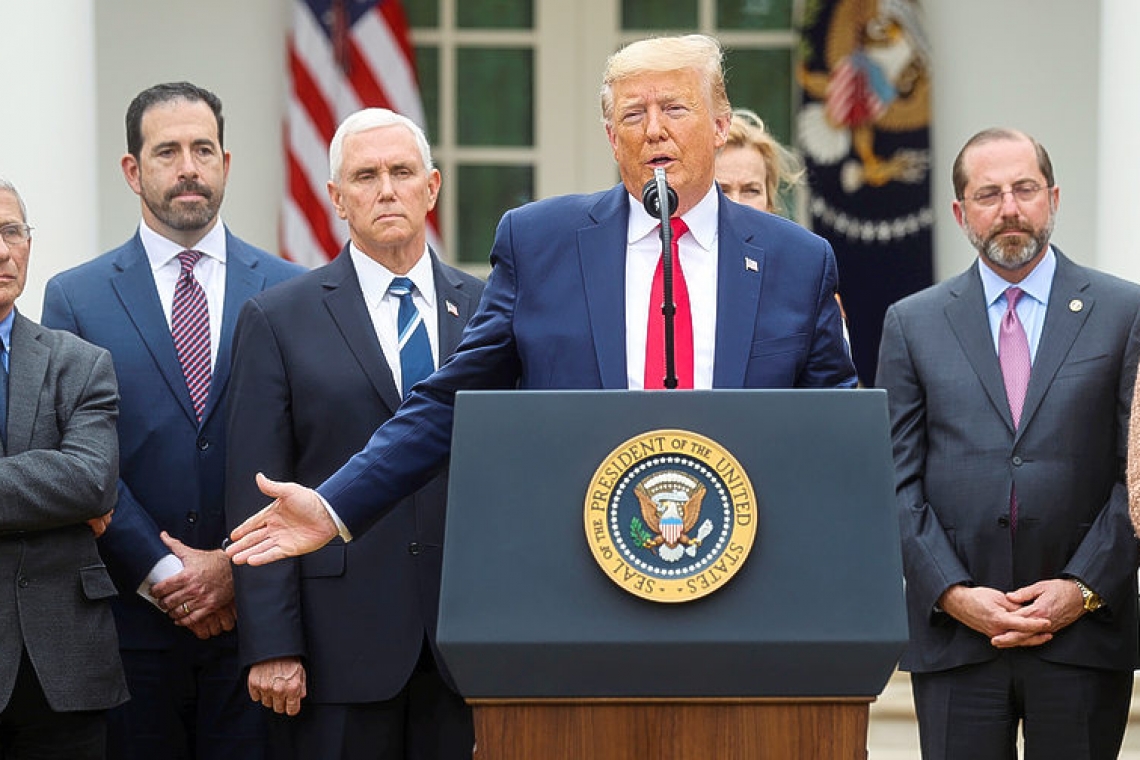WASHINGTON--U.S. President Donald Trump on Friday declared a national emergency over the fast-spreading coronavirus to open up $50 billion in federal aid and said he would "most likely" be tested for the virus soon himself after facing possible exposure.
Trump made the announcement at a Rose Garden news conference as he battled to show Americans he is aggressively addressing the health crisis after appearing to play down the threat for weeks. "It could get worse. The next eight weeks will be critical," Trump said.
Trump appeared on stage with members of his coronavirus task force and business executives after meeting them inside the White House over how to accelerate testing of Americans for the virus to better track the contagion's spread.
Shaking hands freely with the gathered business executives, the 73-year-old Trump later acknowledged he expected to be tested for the virus. He had come into contact with a Brazilian official last Saturday who later tested positive for coronavirus.
"Most likely, yeah, most likely. Not for that reason but because I think I will do it anyways," Trump said. "Fairly soon. We're working out a schedule."
"We have no symptoms whatsoever," he said to a question about whether he should get a test.
Trump said Walmart Inc Chief Executive Doug McMillon had agreed to set up drive-thru testing at store parking lots across the country and that Alphabet Inc's Google will create a website to help determine whether individuals need a coronavirus test.
Trump, who on Wednesday ordered citizens from 26 European nations not to enter the United States for 30 days as of midnight Friday, said his administration “may be adding” the United Kingdom and a couple of other countries.
The virus that emerged in central China in December has now spread to over 130 countries and territories and infected more than 138,000 people worldwide, according to the World Health Organization. It has so far led to 46 U.S. deaths after six more were reported on Friday in hard-hit Washington state.
Trump said his declaration of a national emergency will "unleash the full power of the federal government" to help states and territories in the fight. "Through talent or through luck, call it whatever you want, but through a very collective action and shared sacrifice, national determination, we will overcome the threat of the virus," Trump said.
Asked whether he would provide an economic bailout to the battered cruise ship industry, Trump said they could expect help. "We will be helping them and we will be helping the airline industry if we have to, assuming we have to," he said.
Trump, who had been heavily focused on hard-hit industries in making sure the U.S. economy is not devastated by a slowdown in consumer activity as a result of the virus, used much of his appearance on Friday to focus on the potential human toll of the respiratory illness than can cause pneumonia in severe cases.
He urged every state to set up emergency centers to help fight the coronavirus. "We'll remove or eliminate every obstacle necessary to deliver our people the care that they need and that they're entitled to. No resource will be spared, nothing whatsoever,” he said.
Pressure has been mounting for Trump to declare an infectious disease emergency under the 1988 law that would allow the Federal Emergency Management Agency (FEMA) to provide disaster funds to state and local governments and to deploy support teams. President Bill Clinton in 2000 employed the rarely used measure to declare such an emergency for West Nile virus.
Trump said the federal government was partnering with the private sector to accelerate production of test kits to make them more widely available to Americans. He said there will be about 5 million coronavirus tests available soon but doubted that that many will be needed. He urged Americans to only seek out the test if they feel they need it.
"We don't want people to take a test if we feel that they shouldn't be doing it and we don't want everyone running out and taking - only if you have certain symptoms," he said.
Trump shrugged off a question about whether he was responsible for what many experts have said was slow progress toward expansion of tests to track the virus. "I don't take any responsibility at all," he said.
Alongside Trump was Anthony Fauci, the National Institutes of Health expert who is on Trump's coronavirus task force. He offered a cautious outlook for what may unfold in the short term.
"We still have a long way to go. There will be many more cases. But we'll take care of that," said Fauci, long the nation's top infectious disease expert. "What's going on here today is going to help it end sooner than it would have."
Trump said the federal government would waive interest on student loans and ordered the Energy Department to take advantage of low oil prices to top up the Strategic Petroleum Reserve.







